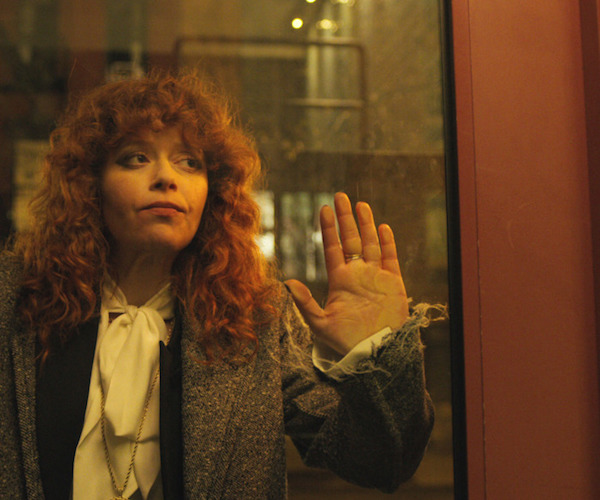WATCH CLOSELY: The Dark Depths of “Russian Doll”
By Peg Aloi
Russian Doll is television made to be savored.

A scene from “Russian Doll.”
If you haven’t watched Russian Doll yet, I invite you to go and watch it before you read this review. There aren’t too many spoilers ahead, but this show is one that benefits from going in as cold as possible.
This new Netflix series, starring (and co-created by) red-hot redhead Natasha Lyonne (Orange is the New Black), has an ostensibly simply but mind-bendingly intricate concept at its heart: people die, and keep returning to the events before their deaths, only to experience them again. It begins with Nadia (Lyonne) at her thirty-sixth birthday party, which is being thrown for her in a friend’s spacious and lavish Manhattan apartment. Coming out of the bathroom (a black-walled room with huge mirror), Nadia leaves the party with a man she’s just met. She’s planning to have casual sex with him, but on the way stops at a bodega to ask if the cashier has seen her missing cat, Oatmeal (he’s the bodega’s cat, too, it’s a New York thing). She notices a young man in distress; there are some drunken hipster bros acting like jerks. She spies a homeless man across the street and feels a flash of recognition.Then she sees the cat and, running without looking, she’s struck by a taxicab and her lifeless body oozes blood into the street.
Within seconds, she is once again standing at the sink in the black bathroom, splashing water on her face and looking in the mirror, shocked and confused. She remembers what happened, and wonders if the joint her hostess gave her was laced with something. All of the people, events, locations, and details in the first scene (including Oatmeal the cat) continually reappear. The interesting conceit is that Nadia is fully aware she has already died; she is both curious and frustrated about the repeating scenario. The more often we experience Nadia’s repeated trajectory, the more we learn about her, and also about her friends. At first, everything keeps happening in the same way, but eventually Nadia figures out that making different choices results in slight shifts in her fate.
But she still ends up dead each time. Still, it seems that the more attention she pays attention to details, to the causes and contexts of what is happening, the more she is encouraged to think there is a way out of this frightening puzzle. Eventually, she encounters someone who’s in the same situation she is in. Together, they try to figure out how to change their inevitable outcome. This begs a cosmic question: if you die, is it possible to go back and change that outcome? But perhaps the question is — are you ever really ready for death when it comes?
There is something very New York about the show, its random moments of beauty, its unexpected bursts of violence.Click To TweetThe obvious meet-cute description for this storyline is Groundhog Day meets Bandersnatch seasoned with a bit of Defending Your Life. But the psychological underpinnings of Russian Doll go deeper, moving into places of regret, cruelty, and compassion (or lack thereof). When Nadia begins to understand how her choices and actions have hurt others, she finds that she is able to change the course of her future. When she chooses different behaviors, that affects the outcome (add in The Butterfly Effect) and shifts her connections to, and realizations about, people she is close to.
Set in Manhattan, the nerve center of the world’s narcissism, Russian Doll is peopled with characters whose personalities span the continuum of self-sabotaging compassion to sociopathic selfishness. Nadia exhibits both extremes, but her self-protective core is tightly wound, like the acid-coated strands of a tennis ball. On one level she’s a typical New Yorker, avoiding obvious danger zones but also tumbling headlong into them on a whim (sometimes literally). There is something very New York about the show, its random moments of beauty, its unexpected bursts of violence, its grandiose structure composed of small, intricate pieces. As Nadia moves through the city, in search of answers, it is as if she becomes her own psychopomp, preparing herself for her inevitable journey to the underworld by picking up bits of wisdom she gleans along the way.
Lest this seem too dark and depressing, the narrative is buoyed up by Nadia’s louche humor and tongue-in cheek cynicism, as well as the whipsmart dialogue spoken by just about everybody. The cast is uniformly excellent, especially Yul Vazquez (seen currently in I Am the Night) as Nadia’s ex-boyfriend and the sensational Elizabeth Ashley as her aunt. The production is entirely helmed by women. Co-creators Amy Poehler (Saturday Night Live and Parks and Recreation), Leslye Headland, and Lyonne wrote all eight episodes, assisted by several other women writers. The episodes are directed by Headland, Lyonne, and one of my favorite television directors, Jamie Babbitt (who worked with Lyonne on the indie film But I’m a Cheerleader). The production design is flawless, from the use of suitably dank, weird or imposing Manhattan locations to an eclectic and brilliantly curated soundtrack. The show is so compelling that I don’t know anyone who has been able to resist watching the entire season in one session. Yet it offers the rewards of a work of art: so chock-full of luscious detail, so deftly layered, that those who choose to re-watch it will discover more to fascinate them with each viewing. I can’t recall another series in recent memory that has thrilled me like this one: Russian Doll is television made to be savored.
Peg Aloi is a former film critic for The Boston Phoenix. She taught film and TV studies for ten years at Emerson College. Her reviews also appear regularly online for The Orlando Weekly, Crooked Marquee, and Diabolique. Her long-running media blog “The Witching Hour” can be found at at themediawitch.com.
